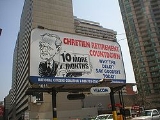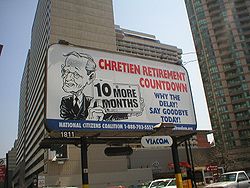
National Citizens Coalition
Encyclopedia

Canada
Canada is a North American country consisting of ten provinces and three territories. Located in the northern part of the continent, it extends from the Atlantic Ocean in the east to the Pacific Ocean in the west, and northward into the Arctic Ocean...
conservative
Conservatism
Conservatism is a political and social philosophy that promotes the maintenance of traditional institutions and supports, at the most, minimal and gradual change in society. Some conservatives seek to preserve things as they are, emphasizing stability and continuity, while others oppose modernism...
lobby
Lobbying
Lobbying is the act of attempting to influence decisions made by officials in the government, most often legislators or members of regulatory agencies. Lobbying is done by various people or groups, from private-sector individuals or corporations, fellow legislators or government officials, or...
group that campaigns against public services, trade unions, and in favour of smaller government and lower taxes. Incorporated in Ontario in 1975, the NCC was founded by insurance agent Colin M. Brown, who began an advertising campaign in 1967 against what he perceived as excessive government spending. Brown was vehemently opposed to public health insurance, although the NCC is now reluctant to take such a harsh stand on this issue, as it would be unpopular with the electorate to oppose a program which currently allows all Canadians the right to health care, irrespective of income. The NCC would go on in subsequent years to campaign against "socialized medicine" and other government programs. The NCC has supported privatization
Privatization
Privatization is the incidence or process of transferring ownership of a business, enterprise, agency or public service from the public sector to the private sector or to private non-profit organizations...
, tax cuts and government spending cuts; it also opposes electoral laws that limit third-party spending. It has been heavily involved in advertising, political campaigns and legal challenges in support of its goals of "more freedom through less government."
The NCC claims a membership of between 40,000 to 45,000 individuals, but has not released members' names. Stephen Harper
Stephen Harper
Stephen Joseph Harper is the 22nd and current Prime Minister of Canada and leader of the Conservative Party. Harper became prime minister when his party formed a minority government after the 2006 federal election...
, the current Prime Minister of Canada
Prime Minister of Canada
The Prime Minister of Canada is the primary minister of the Crown, chairman of the Cabinet, and thus head of government for Canada, charged with advising the Canadian monarch or viceroy on the exercise of the executive powers vested in them by the constitution...
, served as President of the organization from 1998 to 2002.
The NCC holds no annual general membership meetings and provides no financial statements to its members. The organization's constitution distinguishes between 'voting' and 'public' members. Public members pay dues but do not have formal mechanisms for influencing the organization's policies or priorities. Public members are not entitled to be notified of or to attend any meetings, and they are not entitled to vote at any such meetings.
It is headquartered in Toronto and reports an annual budget of $2.8 million. The organization has fought to keep information about itself confidential, and opposed amendments to the Canada Elections Act
Canada Elections Act
Canada Elections Act is an Act of the Parliament of Canada respecting the election of members of parliament to the Canadian House of Commons, repealing other Acts relating to elections and making consequential amendments to other Acts....
that would have required third-party organizations like the NCC to publish the names of all contributors donating more than $250.
During its almost four decades of existence, the NCC has campaigned against:
- the Canada Health ActCanada Health ActThe Canada Health Act is a piece of Canadian federal legislation, adopted in 1984, which specifies the conditions and criteria with which the provincial and territorial health insurance programs must conform in order to receive federal transfer payments under the Canada Health Transfer...
, - the Canadian Wheat BoardCanadian Wheat BoardThe Canadian Wheat Board was established by the Parliament of Canada on 5 July 1935 as a mandatory producer marketing system for wheat and barley in Alberta, Saskatchewan, Manitoba and a small part of British Columbia...
, - the general strike organized by the Canadian Labour CongressCanadian Labour CongressThe Canadian Labour Congress, or CLC is a national trade union centre, the central labour body in English Canada to which most Canadian labour unions are affiliated.- Formation :...
against wage and price controls imposed by the LiberalLiberal Party of CanadaThe Liberal Party of Canada , colloquially known as the Grits, is the oldest federally registered party in Canada. In the conventional political spectrum, the party sits between the centre and the centre-left. Historically the Liberal Party has positioned itself to the left of the Conservative...
government of Pierre TrudeauPierre TrudeauJoseph Philippe Pierre Yves Elliott Trudeau, , usually known as Pierre Trudeau or Pierre Elliott Trudeau, was the 15th Prime Minister of Canada from April 20, 1968 to June 4, 1979, and again from March 3, 1980 to June 30, 1984.Trudeau began his political career campaigning for socialist ideals,...
in 1975 - the admittance of VietnameseVietnamese peopleThe Vietnamese people are an ethnic group originating from present-day northern Vietnam and southern China. They are the majority ethnic group of Vietnam, comprising 86% of the population as of the 1999 census, and are officially known as Kinh to distinguish them from other ethnic groups in Vietnam...
refugeeRefugeeA refugee is a person who outside her country of origin or habitual residence because she has suffered persecution on account of race, religion, nationality, political opinion, or because she is a member of a persecuted 'social group'. Such a person may be referred to as an 'asylum seeker' until...
s ("boat people") to CanadaCanadaCanada is a North American country consisting of ten provinces and three territories. Located in the northern part of the continent, it extends from the Atlantic Ocean in the east to the Pacific Ocean in the west, and northward into the Arctic Ocean...
in 1979-1980 - closed-shop unionsTrade unionA trade union, trades union or labor union is an organization of workers that have banded together to achieve common goals such as better working conditions. The trade union, through its leadership, bargains with the employer on behalf of union members and negotiates labour contracts with...
- the so-called "gold-plated" pension plan for Members of Parliament
- real or perceived government waste in general
- the mandatory long-form census
The NCC founded and funded Ontarians for Responsible Government, a lobby group that played a large role in electing the Progressive Conservative Harris
Mike Harris
Michael Deane "Mike" Harris was the 22nd Premier of Ontario from June 26, 1995 to April 15, 2002. He is most noted for the "Common Sense Revolution", his Progressive Conservative government's program of deficit reduction in combination with lower taxes and cuts to government...
government in Ontario of 1995-2003. It has also legally challenged electoral financing laws limiting third-party advertising spending during election campaigns.
Timeline
- 1967 – National Citizens' Coalition founded by Colin M. Brown.
- 1987 – David Somerville takes over leadership.
- 1993 – The NCC successfully supports Stephen Harper's bid to become a Reform PartyReform Party of CanadaThe Reform Party of Canada was a Canadian federal political party that existed from 1987 to 2000. It was originally founded as a Western Canada-based protest party, but attempted to expand eastward in the 1990s. It viewed itself as a populist party....
Member of ParliamentMember of ParliamentA Member of Parliament is a representative of the voters to a :parliament. In many countries with bicameral parliaments, the term applies specifically to members of the lower house, as upper houses often have a different title, such as senate, and thus also have different titles for its members,...
for Calgary WestCalgary WestCalgary West is a federal electoral district in Alberta, Canada, that has been represented in the Canadian House of Commons from 1917 to 1953, and since 1979. It is located in the western part of the City of Calgary....
. - 1997 – Harper resigns as Member of Parliament to join the NCC.
- 1997 – Stephen Harper becomes Vice-President of the NCC.
- 1998 – Stephen Harper becomes President of the NCC, Gerry Nicholls becomes Vice-President.
- 2002 – Stephen Harper resigns as President of the NCC to seek the leadership of the Canadian AllianceCanadian AllianceThe Canadian Alliance , formally the Canadian Reform Conservative Alliance , was a Canadian conservative political party that existed from 2000 to 2003. The party was the successor to the Reform Party of Canada and inherited its position as the Official Opposition in the House of Commons and held...
. - 2003 – Peter Coleman joins the NCC full time as Chief Operating Officer.
- 2006 – Peter Coleman is promoted to President and Chief Executive Officer of the NCC.

